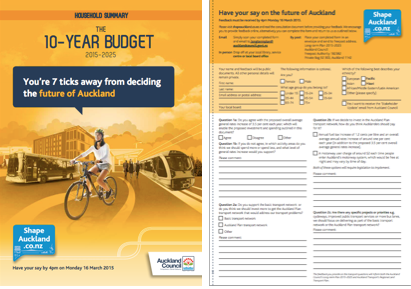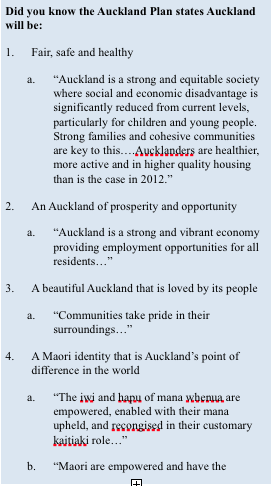If you live in Auckland you most likely have received one of these in your letterbox:
Receiving an Auckland Council survey which offered me the finite choices of motorway tax or fuel tax in exchange for a functional public transport system shocked me into engaging in local government for the first time in my life. The prospect of a motorway and fuel tax freaked me out and I wanted to know – how did we end up in this situation?! In the process I discovered that the Auckland Council budget is massive, $3.5billion each year for the next 10 years, and, that the Auckland Plan actually has a wonderful framework for making Auckland what most of use would want it to be. We have to use it in the feedback for the Long Term Plan (closing 4pm 16th March) to make sure we don’t just get a long term sham, but something that delivers for everyone. To make it easier, here is a template to match the 30 year and 10 year plans. Fill in your dreams for what you want Auckland to be like and give your local boards and progressive councillors the support they need to advocate for a better Auckland.
Living in Auckland you immediately know that public transport is an issue (because the easiest way to get anywhere is in your car), and the mayor is staking his legacy on solving this problem. Unlike other major cities like London, Melbourne, New York etc where spoke and wheel networks connect the city east and west, north and south, but also across sectors (and where you don’t have to check a timetable you just turn up to a station) using public transport is an easy and preferred option. Auckland will only have its first circuit in rail with the City Rail Link, we already have bus circuits but rail can move about 3 times as many people per hour as buses. The last big champion for a workable Auckland Transport was Dove-Myer Robinson that shaped modern Auckland. Students in the 1970s wiggled conga lines in a loop from Auckland Uni to the town hall and back to show support for “Robbie’s rapid-rail” which Muldoon refused to fund and which looks hauntingly similar to what we are trying to achieve 40 years later. So the important question is WHY, why did we not make commitments sensible plans like other cities 40 years ago? And WHAT, what should we do now?
Auckland’s consistent and powerful conservative interests prioritised roads for commerce not a liveable city for all residents. Ironically residents in cars now choke the roads affecting everything. So it seems we have to bite the bullet, and pay an extra 1.2cents per litre, equating to 70cents a week or $40 per year (if you use about $100 worth of fuel per week). Once I did the numbers, this seemed well worth it to me. However I do not support businesses reducing their rates contribution, profit oriented entities should be paying more than households, so please tick DO NOT SUPPORT to Question 5.
There is a lot more going on in that double sided A4 questionnaire than just transport, you can almost see the tug of war between conservative and progressive interests in the two page battleground – but also interesting is what is NOT there, and what all Aucklander’s should know about which is the parts of the Auckland Plan that give us the framework to ask for a more equitable city in this feedback process.
Council should improve the lives of ordinary people. We should not have council staff or CCO CEOs earning mega salaries upto $859,999. Nor should we have people on multiple public boards and trusts collecting $50,000, and more, of public money as fees for each one! Nice life for some! Whether you’re elected office or an employee, or a public board member multiple times, public service is public service, public money should not be squandered in such a shameless way. Why should anyone in the public service of Auckland City earn more than the Mayor at $259,500? Top salaries should be scaled down below this amount, and board members of public organisations and trusts should be capped at 1.5 times board fees. Someone on six boards is certainly not contributing $50,000×6 of value. Auckland Council related boards and public trusts should not be just another public enterprise to line the pockets of the growing elite of NZ society, especially when lowest paid council workers are not even on a living wage.
Feedback on Local Board priorities are also included in the 10 Year Plan consultation. It seems not all local boards are equal in terms of how funding is shared out from Auckland Council. While it would make sense for areas such as Mangere-Otahuhu with more at risk communities and new migrants, as well as being historically underfunded, to get more services and facilities, as it currently stands they will receive one of the lowest per capita amounts with only a few of the board’s priority areas funded, while other boards such as Howick receive the highest per capita amount with many projects to be funded. This could all change depending on feedback our local board’s ability to make arguments to get a fair share of funding.
So, Aucklanders, despite the recent low turn out for national elections, let’s see what kind of participation we can muster for the BILLIONS at stake in local politics. If you are feeling disconnected or worn out from a tiring commute, know that we have ended up here, in part, because of consecutive conservative councils who have not invested in workable public transport, who have stripped money out of community centres for motorways and mega salaries and board fees, and taken rates from our poorest communities but not proportionately reinvested them back to serve those communities. We now have better access than ever before to what council is up to, with live-stream able to show us what our councillors are about. Find out about your local board plans, meet your local board members at Have Your Say events, tweet your opinions to @AklCouncil #LTP2015, or fill out the A4 as well as this dream template. Don’t let there be another missing $million. Get the money back into our communities.
P.S. Some progressive feedback ideas might include:
- The council should be a model of bestpractice workplace standards by ensuring: all workers including contract workers are on at least a living wage, and no workers are on zero-hour contracts
- The council should not allow excessive salaries in CCOs, the council, or those holding multiple positions on public boards and trusts collecting multiple fees. Scale back all salaries to be proportionately less than the Mayor’s salary of $259,500, and cap fees that individuals can receive at 1.5x the average board fee.
- Community hubs should be funded to support families and community groups running initiativies such as: low cost afterschool care, elderly community care, environmental clean ups & courses (e.g. composting), community enterprises like toy libraries and tool libraries, resuse and salvage shops, food cooperatives, community gardens, local activities like markets and music events that create a sense of community, intercultural/intergenerational interaction and an increased sense of belonging.
- All community centre kitchens should be registered so community groups and social enterprise can make food in them and sell to fundraise, making it easier to comply with food safety rules.
- A higher proportion of rates should be spent in the areas where there are at risk communities such new migrants, high levels of unemployed or under-employed, and low income households.
- Publicly funded cultural events should seek to provide employment back into the communities connected with the event.
- Local boards should purchase goods and services as much as possible from their local board area.
Roshni Sami, BA/BCom, MA, Auckland, New Zealand. — Roshni Sami is an activist, researcher and project manager. She is of Pakeha and Fiji-Indian heritage. She returned to Fiji to after grad school and worked for six years in the Pacific doing work for development agencies such as UNWOMEN, AusAID and other not-for-profits organisations including running the Pacific Network on Globalisation a trade policy watch-dog. Disillusioned by what she saw in the development sector, she returned to New Zealand in 2011 and worked in property for three years, before supporting the Internet MANA campaign in the 2014 election. She is currently volunteering with Migrant Action Trust in Auckland.







Great to see you blogging.
Auckland is a great city. We need to make sure our civic leaders represent the majority of its people. I hope the vision for a better transport network does become a reality as we grow towards a city of 2 million people.
I agree important decisions shouldn’t be only seven ticks away. Sometimes simplistic choices presented to the public to only tick and comment does not help to engage us all in the decision making process. It instead infuriates you.
While I will not dis CEOs and Managers at the top for their pay. I personally accept that we must pay for the best people (as long as they are the best people). Pay at the top is warped on an international market pay scale that is growing far too quickly. I disagree on this point and wouldn’t call for a cap to be at the Mayoral pay rate. Anyone (with money and a support base) can be the Mayor.
Like most I do feel for the hard working front of counter staff who get paid at local market rates squeezed out by what we pay the people at the top. Pay for these people need to be reviewed.
When you see ‘jobs for the boys’ being created with the recent London Assignment highlighted recently, I do lose a bit of confidence in the people in these leadership roles.
Keep up the blogging Roshni, will wait in anticipation for a future post.
Comments are closed.